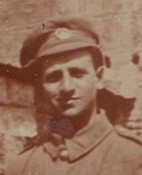This story goes as follows:
“In August 1915, I enlisted as a volunteer, I was sworn in and took the ‘King’s shilling’. In January 1916 I received call up papers, but was able to receive deferment for family reasons, until 8th June 1916 when I was sent for basic training to Ashton-under-Lyne, just outside Manchester.
After a short training, I was sent to join the 7th South Wales Borderers. I spent time in Wales and in February 1917 was sent to France, landing at Le Havre, where we were drafted into groups of 250, and my group was scheduled to remain in France. I was quite upset at this, as most of the heavy fighting was taking place in France at that time. Fortunately, at the last minute I was amongst a group that was redrafted to Salonika, in northern Greece. We travelled by cattle truck to Marseille in southern France, the journey taking eight days, and immediately boarded the ‘Camaroria’ which set sail that morning with 2,000 soldiers on board.
At one time, I was ordered onto a life raft to look for submarines. After a while I saw a ship in the distance, and gave the alert, but fortunately it turned out to be a Red Cross ship, not the enemy.
A few days later, we docked in Malta, in Valette Harbour, and saw children diving for coins. Due to the presence of enemy submarines, we moved to Grand Harbour and remained there from Friday to Sunday. We then left Malta en route for Salonika.
On arrival there, we marched to ‘Summerhill Camp’ passing a destroyed Zeppelin on the quay side. During the march we had to scatter on numerous occasions, as enemy aircraft were overhead and we lay flat on the ground until the raid passed over.
From here we were directed to the Vardar River on the border of Serbia and Bulgaria. On arrival to join the Regiment, a 48 hour bombardment had just finished, and I was most distressed to hear that a few friends from Manchester had perished in this raid. I went to visit their graves so I could tell their parents.
We were called before the Captain, who asked each soldier if he had a special interest, which I didn’t, so I chose signalling. I was sent for a month’s course where I learnt Morse code and signalling with flags and lights. I was then put on duty as a relief man.

see larger image
Whilst on duty in the trenches I passed the secret password to the artillery because the enemy was cutting the barbed wire fences, and 6 out of 12 were cut. I gave the signal and within a few minutes 400 guns were fired at the enemy, in front of our trenches. In the blast I was thrown from one end of the dugout to the other, and the telegraph lines were damaged. One of the men went to inspect where the lines were broken, managed to fix them, and was later awarded a medal for this. I was given recognition for giving the alert. Unfortunately, he was later killed, and luckily my life was spared.
We were then sent to a resting place away from the Vardar river for two weeks. At this time Salonika was full of disease, malaria, typhoid and black water fever, so the inhabitants set fire to a square mile of land to be rid of the diseases. There was therefore no bread nor provisions for the civilians, so the troops gave up their flour and rations and for five weeks we survived on battle rations of bully beef and hard biscuits. Not very far from the camp was a Greek camp, I went there, and in a dugout found 6 soldiers, 5 had beards, and one had a moustache. I said “Yehudi?” meaning “are you Jewish?” the men with beards pointed to the one with a moustache and he repeated “Yehudi”. I asked for bread in Greek. He spoke to his friends, who passed him a loaf of bread which he shared with me, and gestured for me to return again another day.
When I rejoined my Regiment, I had received three parcels of food from my mother and one from my sister Esther, who was living in the USA. They contained biscuits, chocolate, tinned fruit, tea, sugar cubes and tinned sardines. Naturally I shared everything with my friends, it was a special occasion after weeks of a poor diet.
The order came though that we were to march to Turkey. This meant 20 miles each night for six nights. My feet were covered in blisters from heel to toe, and the doctor’s orderly had to burst them with a needle. The Bishop of London arrived to visit the men, and we were to meet him at Lake ‘Longazon’ - where we were allowed to bathe. The blisters became inflamed and I was unable to stand let alone walk. I was sent to hospital and remained there for three weeks to allow the skin to heal and harden on the soles of my feet. I have suffered with bad feet from that day to this.
At Passover time I went to Salonika town for two days, and visited a beautiful synagogue built of marble. I was given matzo (unleavened bread) and met Jewish men from all over the world. One was a dark French colonial who spoke Yiddish, we were able to converse, and he sang songs, one in particular that I remember was called ‘Almonds and Raisins’.
On a bus I met two elderly gentlemen who explained they were retired bankers from Bulgaria, and they told me that the Jewish population of Salonika numbered about 400 persons, and had settled there having been driven out of Spain during the Spanish Inquisition.”

